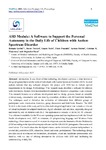ASD Module: a software to support the personal autonomy in the daily life of children with autism spectrum disorder

Ver/
Use este enlace para citar
http://hdl.handle.net/2183/28091Coleccións
- Investigación (FIC) [1723]
Metadatos
Mostrar o rexistro completo do ítemTítulo
ASD Module: a software to support the personal autonomy in the daily life of children with autism spectrum disorderAutor(es)
Data
2015-12-04Cita bibliográfica
Groba B, Pereira J, Nieto L, Pousada T, Falcón S, Munteanu CR, et al. ASD Module: a software to support the personal autonomy in the daily life of children with autism spectrum disorder. En: [Proceedings of the] International Conference on Multidisciplinary Sciences (MOL2NET); 2015 December 5-15. Basel, Switzerland: MDPI; 2015.
Resumo
[Abstract] Introduction: It was observed that technology developers expressed a clear interest to design programs that meet the needs of individuals with Autism Spectrum Disorder (ASD). Several authors indicate that any software designed for people with ASD has to include special requirements in the design. Methodology: This research study describes a software for children with ASD named Module ASD and describes the interactive process of design that it was followed. This research focuses on a software development and the design process, based on scientific evidence study, consultation and tests done by specialists, children with ASD and their families. The techniques used to formalize the collection of information from different groups of participants were: observation, interview, group discussions and field book. Results: The ASD Module is the result of the study and it is a free technological application that is made up of a set of virtual keyboards (or adapted interfaces), digital schedules and activities, especially designed and tested by and for children with ASD. The application is included in the In-TIC PC software. The software is available for the Windows operating system and was implemented with the Visual Studio development tool, .NET environment, C# programming language and Windows Form technology. Other materials used for content development were the Interactive Books Multimedia (LIM according to the Spanish acronym) software and the ARASAAC pictograms. Discussion and conclusions: The results show that the digital content can be oriented to promote independence in several daily activities (ADL, education, leisure and social participation). This technology design provides useful information for researchers, developers, social and healthcare professionals and families, with the aim of offering alternatives for children with ASD and facilitating the understanding of daily life.
Palabras chave
Autism spectrum disorder
Technology
Software
Design
Daily life activities
Technology
Software
Design
Daily life activities
Versión do editor
Dereitos
Atribución 3.0 España






